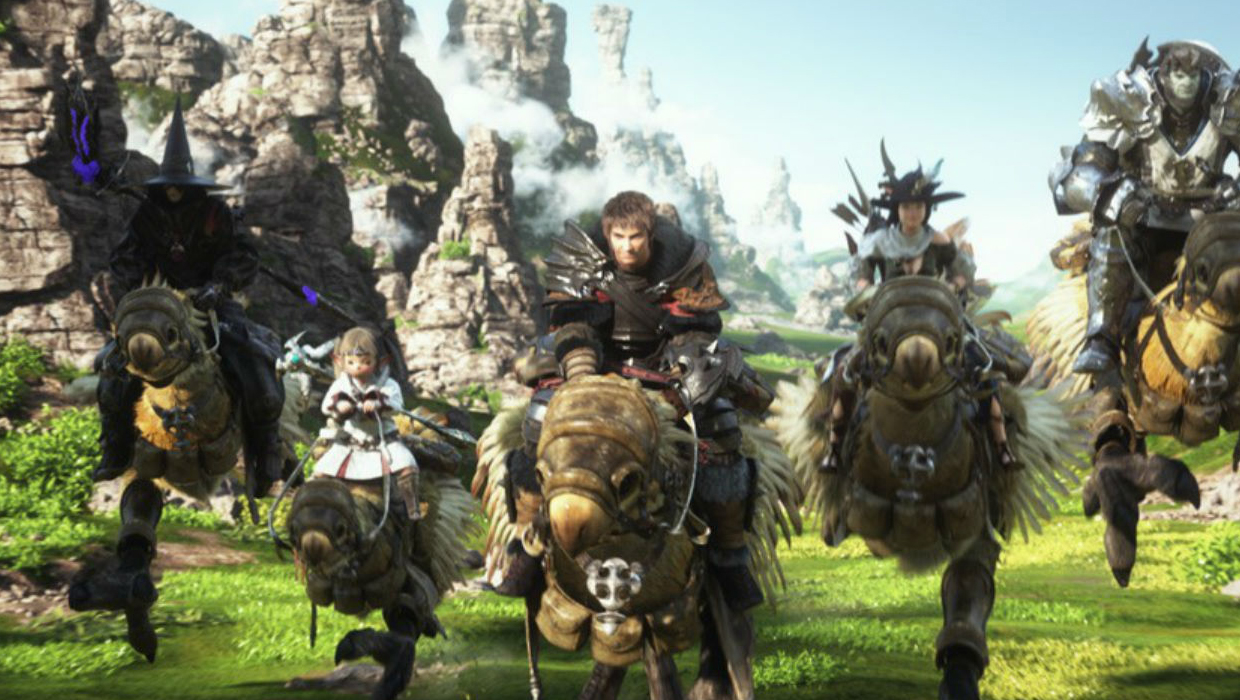12DOVE Verdict
Pros
- +
Beautiful
- +
unique world
- +
Freedom to level how you want
- +
Engaging
- +
fleshed-out story
Cons
- -
Repetitious leveling and questing
- -
Occasionally uneven difficulty
- -
Awkward UI decisions
Why you can trust 12DOVE
A smorgasbord. That’s what Square Enix’s new reincarnation of Final Fantasy XIV is. You want to level? Great, here are three or four ways you can do that, take your pick! Want to play with other people? Here’s a few systems that make it as simple as possible. Want to craft? How about eight different professions! Want to play a different class? There's plenty. You can switch whenever you want.
But this isn’t that straight-out-of-the-'80s buffet joint from your hometown: this is Eorzea, an evocative, finely crafted world that highlights just how reliant MMORPGs have become on Tolkien-cribbing by refusing to bow to the standard dwarf-elf-halfling tropes. It’s a beautiful and polished world: walk through the expansive, melancholy tinged deserts and wonder-filled forests and you’ll start to feel home at home very, very quickly. Add in a stirring and contemplative soundtrack--a standout even amongst Final Fantasy’s storied heritage--and you won’t want to leave.
The world, combined with the myriad gameplay options at your disposal, is what cements FFXIV as a great MMORPG, making it another latter-day entry that refines proven formulas into a consumable, enjoyable whole--but doesn’t add much innovation to an already stale genre.
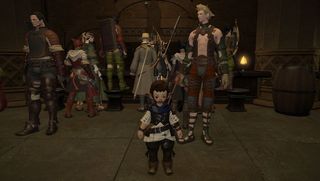
"It’s a beautiful and polished world..."
At the beginning, you'll create a character, customize him or her--the character creator is deep enough, but clunky; you’ll tire of playing with it long before your character is perfect--and then pick from one of the game’s eight starting classes, which align with the traditional tank/healer/DPS model. Then you'll enter the world. A soporific handful of tutorial quests teach you how to play, and before long, the game opens up. Your only goal is to become more powerful. But you can do it in a few different ways: standard MMO quests; repeatable quests called Levequests; group affairs called Guildhests; straight-up grinding on enemies; or FATEs, which are Guild Wars 2-style public quests that occur randomly throughout the game’s environments. All these are readily accessible within minutes. It sounds simple, but beneath the layers is a certain kind of genius: Square Enix is allowing you to play whatever kind of MMORPG you want.
It’s that smorgasbord again. Want World of Warcraft style quest progression? Or old-school monster slaughter akin to early EverQuest? Perhaps you want something more modern, like what you’d find in Rift? FFXIV manages to encapsulate all these genre styles while keeping the quality level high. As a player, you’re liberated--free to climb the leveling curve as you’d like, and mixing and matching as you go to keep from getting burned out.
The game’s class system lets you eat what you want, when you want, too. Instead of the traditional stuck-with-what-you-picked model, FFXIV ties your class to your weapon choice. Tired of playing as a gladiator? Unequip your sword and pick up a spear--your class will automatically switch to Lancer. Equip a staff and you’ll become the magic-wielding Thaumaturge. It’s a freeing feeling, knowing you can invest time in whatever you feel like and still have it pay dividends to a single character. FFXIV players can change up how they’re playing quickly, without much investment, and it helps to keep the game fresh and enjoyable.

"FFXIV players can change up how they’re playing quickly...and it helps to keep the game fresh and enjoyable."
But the class system also adds depth: at later levels, you’re able to carry over abilities from other classes you’ve leveled. Doing so allows players to customize their characters and sidesteps the doppelganger-ism often found in MMORPGs. Similarly, you can periodically increase an attribute of your choosing as you level, further ensuring your character feels like your own.
Meanwhile, combat in FFXIV is stock MMORPG fare with a sprinkling of systems that work to keep you engaged. It’s polished and fast without sacrificing transparency, and will feel familiar to veteran MMORPG players: tab targeting, a few hotbars, automatically delivered standard attacks, some light active dodging. Each class, though, features a small wrinkle that makes sure you have to keep your mind in the fight--and helps make the leveling curve go by faster. For instance, the Gladiator class features abilities that do more damage and trigger added effects when you do them in the right order. The Marauder receives bonuses for executing abilities on specific sides of enemies. These are some of the most fun and rewarding areas of the combat experience. It’s funny how even small mental procedures make battles feel so much less routine, with an addictive and engaging rhythm and flow.
The game shines the most in group scenarios, where your class can focus on fulfilling its specialized role. FFXIV isn’t afraid to make group encounters noticeably more difficult than the rest of the game--jarringly so. A lot of pressure is put on the tank to hold the enemies’ attention via a combination of abilities and attacks, while damage-dealers and healers need to maintain a certain discipline in their output: too much, and the monster will turn their attention to them with a high likelihood of death. Too little and the fight will last forever. This kind of thing is present in many MMORPGs, but it’s amplified in FFXIV to great benefit. Playing in an effective, veteran group is rewarding and, for lack of a better term, will make you feel like a badass. It’s also true to the game’s legacy--what is Final Fantasy about if not a group of people coming together to, well, fight stuff?
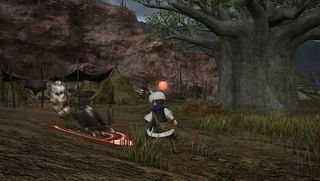
"You have to get to level 50 somehow, and most of it is going to be a fetch quest or a kill-10-rats kind of thing."
Also true to the Final Fantasy name is the game’s focus on plot. And that’s a good thing, because this is one of the most fleshed-out and well-executed MMORPG plotlines you’ll find. It charts your progress from a no-name adventurer to a celebrated hero, and you’ll meet a large (confusingly so, perhaps) cast of characters along the way. The narrative also does a good job of sending you out into the world away from your starting area, ensuring that the work Square Enix put into all the corners of Eorzea isn’t wasted. Each class has a story-based quest-line that largely focuses on your class guild (these also determine your starting city). The brilliance of these is they exist as more than just leveling content--they’re challenging tutorials that teach you the role your character is supposed to play in group contexts.
(A note to all our Final Fantasy nerds out there: this game is stocked with references to older games in the series--they’re welcome additions that will make you smile, even if they don’t add much in the way of substance.)
And rejoice, MMORPG players! You can now grind levels from the comfort of your couch, because there isn’t a huge difference between the PS3 and PC versions of the game. The PC version is significantly prettier, and the console offering’s draw distance will seem very underwhelming after playing on your computer. But the really important thing is that Square Enix has finally delivered a controller scheme that works for MMORPGs. It’s not the easiest thing to grasp, and you might experience some accidental deaths because you get your fingers in knots at first, but give it a few hours and a handful of levels and it’ll become a more-than-serviceable way to play the game.
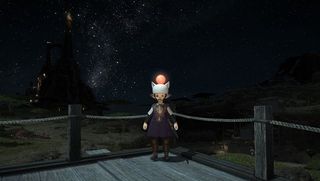
"Both versions of the game are marred by occasionally annoying design decisions."
Both versions of the game are marred by occasionally annoying design decisions. Quests often ask you to go all over the map, making for annoying travel times, even with the game’s generous teleportation system. Some interfaces have annoying quirks that take time to get used to, especially when you’re trying to sell something. These are minor complaints that are only noticeable because of how polished most of FFXIV is.
It should be noted that FFXIV is not a game without grinding. You have to get to level 50 somehow, and most of it is going to be a fetch quest or a kill-10-rats kind of thing. Yes, there are many ways to level. But sometimes it’s just window-dressing: killing 10 rats for a quest or killing 10 rats just for the experience they grant is still the same activity. Levequests--a form of questing that is slightly customizable in difficulty and offer rewards for speed--and standard quests really aren’t that different, barely bubbling up beyond played-out MMORPG tasks. Even FATEs, the game’s public quest system, often just have you killing monsters. Those interesting wrinkles in combat help make this all more palatable, and so does the array of leveling options you have. But if you’re grind-sensitive, FFXIV will burn you out. Sometimes, though, in a world this gorgeous--wait until you see that sunset!-- it doesn’t matter that you’ve been doing essentially the same thing for four hours. It’s just nice to be there.
The thing about buffet dinners--smorgasbords--is that they’re not where you go to try a chef’s latest, craziest concoctions. When you’re trying to cram everyone’s favorite meal in, it’s hard to try something new, to push the envelope. Square Enix doesn’t offer much innovation with Final Fantasy XIV: this is a realm reborn, not the MMORPG genre. But the game is expertly prepared, and even if the systems are all familiar, they take place in one of the most enchanting MMORPG settings ever. So eat up. Get your fill. This one’s an enjoyable feast.
This game was reviewed on PC.
More info
| Genre | Role Playing |
| Description | A fully redesigned MMO adventure rebuilt from the ground up, and centers on the core concept of rebirth, featuring a new world to explore and storyline to experience. |
| Franchise name | Final Fantasy |
| UK franchise name | Final Fantasy |
| Platform | "PS4","PC","PS3" |
| US censor rating | "Teen","Teen","Teen" |
| UK censor rating | "","","" |
| Alternative names | "Final Fantasy XIV A Realm Reborn","Final Fantasy XIV Version 2.0" |
| Release date | 1 January 1970 (US), 1 January 1970 (UK) |
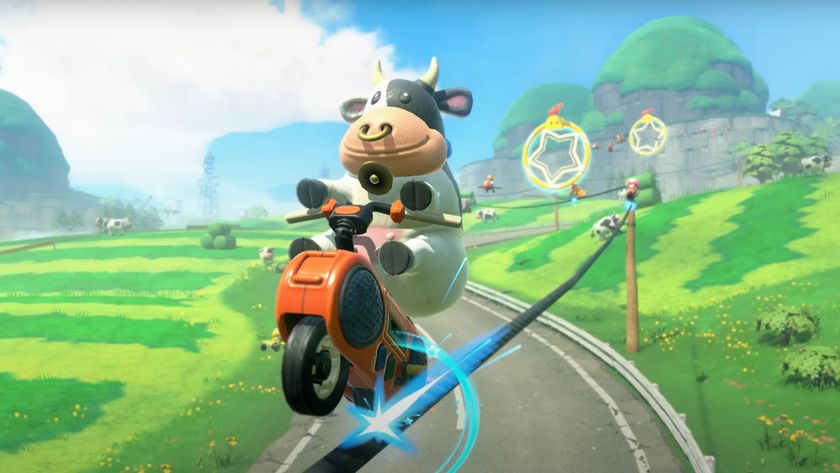
Mario Kart World appears to have at least 50 playable characters, and it has a baffling list of newcomers including the Moo Moo Meadows cow, a crab, and a dead fish: "TRULY PEAK CHARACTER VARIETY"

The first Nintendo Switch 2 pre-orders I've seen just went live

Avengers actor Carrie Coon didn't return for Endgame after a money dispute, and Marvel allegedly replied she should "feel fortunate" to be part of the MCU
